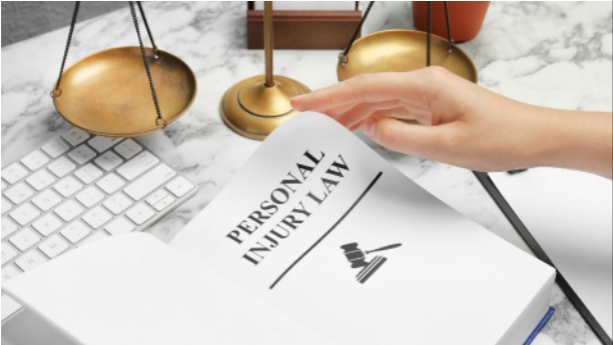What Damages Can You Recover in a Personal Injury Lawsuit?

Physical, emotional, and financial losses can result from an accident. These may include unanticipated medical expenses, weeks or months of lost wages, and ineffable harms like emotional distress.
If another party is responsible for your accident, you can demand compensation for your losses, referred to as damages. You may be entitled to various damages after sustaining an injury in an accident.
This post will help you understand what damages you can recover from a personal injury.
Contents
Three Categories of Damages are Typically Awarded
Statistics show that the United States experienced an increase in civil case filings in 2020, including an increase in personal injury cases. In 2019, the number of claims for personal injury increased by 97%, with product liability cases rising by 55,121. Each year, it increases by over 400,000.
However, only 4% of these claims, or 16,397, go to trial. Motor vehicle accidents are the leading cause of personal injuries, accounting for 52% of all cases. Product liability cases, on the other hand, account for only 5% of personal injury cases.
Personal injuries can occur at any time in Louisiana, emphasizing the importance of being prepared and knowledgeable about the legal aspects and recovery processes involved. Fortunately, seeking assistance from a reputable Louisiana personal injury law firm can provide valuable support.
Louisiana personal injury law firm have experienced attorneys who specialize in handling personal injury cases. They have in-depth knowledge of the legal principles and procedures involved in such cases. They can provide you with expert advice and guide you through the entire legal process, ensuring that your rights are protected.
Look for firms that specialize in handling personal injury cases and can guide you through the process of gathering the necessary evidence, assessing the extent of your injuries, and determining the resulting damages. Moreover, these firms can help you evaluate the potential value of your case, ensuring you receive the appropriate legal advice and representation.

- Economic Damages
Damages to the victim’s finances are called economic damages. It may include any out-of-pocket costs associated with the accident or your injuries. Monetary damages may also encompass invoices received from third parties related to the accident.
- Non-Monetary Damages
Non-economic damages include the agony and suffering an accident victim endures due to their injuries. Each individual suffers differently, so these damages are subjective. Therefore, estimating the value of damages for pain and suffering can be challenging.
Keeping a journal detailing your struggle to recover from accident-related injuries increases your likelihood of receiving maximum compensation for non-economic damages. When contending for the maximum prize, your personal injury attorney can use details such as your inability to perform certain activities, your daily pain levels, bouts of depression, and the impact on your relationships with loved ones.
- Recriminatory Damages
A few categories of personal injury cases are eligible for punitive damages. Punitive damages are awarded to ‘punish’ the responsible party and discourage them from repeating similar behavior.
The victim must provide valid and authentic documents proving that the defendant acted with malice, intentional misconduct, wantonness, fraud, oppression, or conscious indifference to the consequences of his actions. Meeting this standard of proof is challenging.
What is a Personal Injury Lawsuit?
Personal injury lawsuits arise when an individual causes harm through accidents. The responsible party’s insurance company will compensate the injured party for medical expenses, agony and suffering, and other ongoing medical expenses. If you have concerns about medical negligence or other legal matters, your personal injury lawyer will handle communication with insurance companies and hospital lawyers.
A personal injury case can be formalized through representation by a personal injury attorney in a civil court proceeding. This court session aims to determine who is lawfully at fault through a court judgment or, as is far more common, through informal settlement negotiations before a lawsuit is filed. The length of the case may depend on the circumstances of the personal injury and the amount of damage done to the person who was hurt. Sometimes it will last for a few months or years.
Personal injury attorneys have the resources and expertise to conduct a comprehensive investigation into your case. They will gather evidence, interview witnesses, review medical records, and consult with experts to build a strong case on your behalf. This includes collecting evidence to establish liability (who is at fault) and to demonstrate the extent of your damages.
Many personal injury claims involve dealing with insurance companies. Lawyers from a personal injury law firm can handle all communications and negotiations with insurance adjusters on your behalf. They have experience in dealing with insurance companies’ tactics and can advocate for your rights, aiming to secure a fair settlement that covers your damages.
What Types of Damages are Recoverable in a Personal Injury Lawsuit?
Damages in Compensation
Damages are paid to directly compensate for the non-breaching of what was calculated. It is known as compensatory damages. Occasionally, calculating the value of the promisor’s performance is straightforward, such as when the non-breaching party has a determinable cost and profit amount. Typically, the amount falls within the range of $10,000 to $100,000 for a $100,000 house.
When the performance is a service, monetary compensation is commonly used to compensate the injured party. It would take replacing the service with another provider. However, the calculation is frequently tricky, mainly when the performance is a service that cannot be replicated readily.
Incidental Damages
In addition to compensatory damages, the non-breaching party may also be entitled to recover incidental damages, which include expenses incurred to mitigate breach-related losses. The costs incurred by the non-breaching party to mitigate the breach-related loss are part of the definition of accidental loss. To obtain substitute products or services, the non-breaching party may be required to pay a premium or special fees to find a new supplier or source of work.
Consequential Loss
Consequential loss refers to the indirect adverse effects stemming from the destruction of business property or equipment. Business owners can purchase insurance to cover property and equipment damage, as well as secondary losses.
Liquidated Damages
In specific legal contracts, liquidated damages are presented as an estimate of otherwise intangible or difficult-to-define losses to one of the parties. These damages are estimated and stated in advance when the contract is signed.
They are paid out if a breach of contract occurs. When actual damages are hard to compute, liquidated damages serve as a reasonable representation of losses. When a contract is signed, the parties must make the most rational assessment possible for the liquidated damages clause.

Nominal Damages
A small amount that a court orders someone to pay to another person they have injured, but not seriously. The trader did not lose a transaction and received only nominal damages when a buyer backed out.
One example of minor damages is when a defendant breaches a contract and fails to fulfill the terms of the agreement, but the plaintiff suffers no injury as a result.
Damages Punitive
Punitive damages are those awarded to penalize a defendant in a civil action where criminal sanctions are unavailable. They are appropriate in cases where the defendant acted intentionally and maliciously and are believed to deter others from engaging in similar behavior.
There are no specific legal guidelines for punitive damages. At their discretion, the judge or jury may award whatever amount is deemed necessary to redress the injustice or deter similar behavior in the future. This means that, in appropriate cases, a wealthy defendant may be hit with much greater punitive damages. However, in any situation, the judge has the discretion to reduce all or part of a punitive damages award if they find it excessive.
Recovery of Damages
Recovery of damages means helping clients recover and return as much as possible to their condition before the loss or injury. While each case is unique, procedures are typically consistent.
During the consultation, an attorney specializing in personal injury cases can provide clarification on the law, approximate the value of your case, and explain the case procedure.
An essential step in your personal injury lawsuit is timely submitting court documents. You must submit a legal claim to receive compensation. The legal documentation must adhere to specific content and format requirements. The records you file establish the context for your damages and the evidence you will present in court in personal injury litigation pretrial motions.
Pretrial case preparations significantly influence the outcome of most personal injury cases. Your attorney may file pretrial motions and take legal measures to gather evidence and construct a strong case—pretrial settlement discussions. Once a strong case has been developed with the help of a personal injury attorney, settlement negotiations can begin. The substance of your legal claim destroys the outcome of negotiations.
Engage in mediation and post-trial motions. You may participate in out-of-court resolution initiatives, such as mediation. The expertise of your attorney will contribute to the effectiveness of these sessions. You may also choose to litigate your claim in addition to mediation. Moreover, your legal team can assist you with post-trial motions and the collection of your final judgment.
Conclusion
Generally, filing a claim for personal injury is a time-consuming endeavor. Compelling evidence strengthens your claim and helps you discuss legal matters with your attorney by keeping accurate records of what occurred. Documenting your experiences afterward can bolster your case and ensure that the insurance company addresses your claim.
They can assist you in understanding your legal rights, assessing the strength of your case, and guiding you in pursuing your claim. Keep in mind that most personal injury attorneys offer free consultations, allowing you to seek legal counsel and make an informed decision without any financial obligation.






